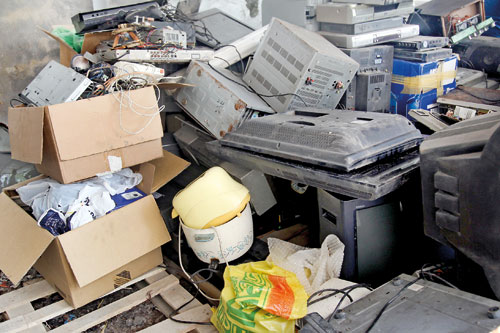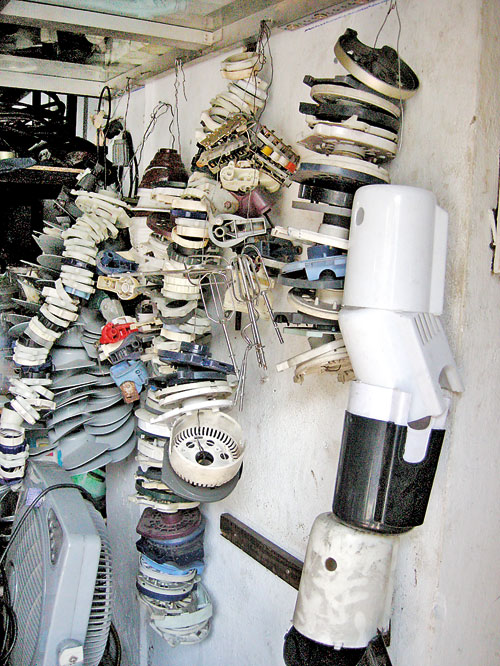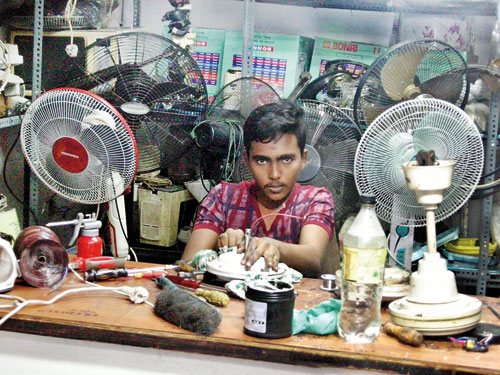News
e-waste: Turn pollution into prosperity
The lack of a proper e-waste collecting system has raised concern among the environmentalists who say waste is being disposed in a haphazard manner thereby adding to the pollution — but a proper method could turn possible pollution into prosperity.

The failure to have an organised collecting system is also leading to a situation where e-waste is being piled up in houses, buildings and warehouses. Pix by Athula Devapriya and Priyantha Wickramamarachchi
The failure to have an organised collecting system is also leading to a situation where e-waste is being piled up in houses, buildings and warehouses.
The Central Environmental Authority also said the lack of a proper unit to collect e-waste had added to the pollution crisis in Sri Lanka.
Biodiversity Conservation and Research Circle environmentalist Supun Lahiru Prakash said immediate steps needed to be taken for a proper method of e-waste collection.
Electronic devices have valuable metals such as gold and other items which could be reclaimed or recycled, he said. Unfortunately, e-waste had become one of the main polluters of soil, water and air because of the toxicity of the chemicals in the devices.
Mr Prakash said the Government should launch a management programme for recycling of the e-waste items and minimising health hazards.
He said the people also should be educated about what to do with their e-waste and how to recycle some of the items.
He also called for laws against e-waste dumping and action against those who do so.
He proposed that the Government should set a yard where people could hand over e-waste and various items could be recycled.
He blamed Environmental Ministry and Central Environmental Authority officials for the failure to come up with an e-waste policy and to set up a proper e-waste collection and recycling programme.
He said that because of the lack of proper knowledge most people either haphazardly dispose their e-waste. Some even burn them, producing toxic gases. There is also little or no inspection of recycling sites. They should be regulated, he said.
CEA Director General P.B Hemantha Jayasinghe admitted there was no well-coordinated programme to manage e-waste. He said there was a need to create a centre to collect e-waste and sort out what could be recycled.
 He said there are a few CEA-registered recyclers
He said there are a few CEA-registered recyclers
He added yet there are few CEA registered recyclers who make use of electronic items and create materials for reuse. He advised private companies to make use of these recyclers to properly dispose of their e-waste and ensure the valuable items were recycled without polluting the environment.
Responding to charges, he said there were laws relating to the dumping of e-waste, but much more needed to be done and the people needed to be properly educated on this issue.
The CEA chief said they were encouraging the people to hand over their broken refrigerators to recyclers without removing parts and thereby releasing harmful gases into the atmosphere.
“A house-to-house collection system also should be implemented to prevent people from handing over e-waste to used item collectors who normally savage valuable parts and dump the rest,” he said.
He pledged that legal action would be taken against such collectors who dump e-waste on roadsides.
He said local councils should also implement programmes for proper collection of e-waste while the environmental police should take action against e-waste dumpers.
A senior Environmental Police officer said they had powers to take take action against people who dump e-waste at public places.
He advised the people to hand over e-waste to registered collectors or local authority collectors who could separate the e-waste into non-usable and reusable.
Meanwhile, a company which annually conducts an e-waste collection drive continued it this week also.Spokesman Yaddahawa Marasinghe said they had been collecting e-waste for the past four years. It was part of their corporate social responsibility mission and every year more people handed over e-waste to them.
According to him, the company works with CEA-registered recyclers to process the items and even export items to be recycled in foreign countries. The spokesman said last year they were able to collect 12 tons of e-waste and made full use of it.
Mr Marasinghe requested the people to send their broken refrigerators, televisions, irons, batteries, computers and other electronic items to the company without trying to remove parts from them because this could have bad effect on the environment.
Electronic equipment repairer A Kallidas who also services and sells electronic equipment said that they salvage as much as they can to repair items and give the remains to the waste collectors or old equipment collectors.
“Since government e-waste programmes are not properly organised, we have no option but to give them away,” he said.


